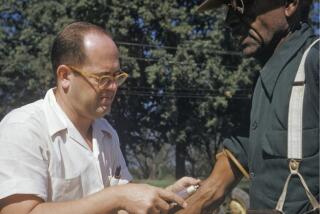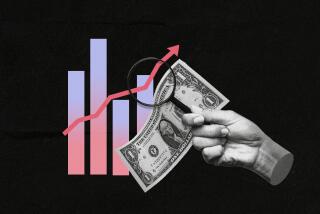Survey Dispels Some Myths About Blacks And Investing
- Share via
Time and time again, I hear that African Americans can’t be bothered with saving and investing because they’re too consumed with spending what money they have.
The word on the street is blacks are good consumers. Maybe too good.
“Why can’t we be more like white people and invest our money?” one woman asked me at a community meeting.
One person, who called in to a radio show I do, complained that “our people” are too interested in wearing their wealth.
I’m more than a little disturbed that a lot of this anecdotal criticism is coming from my own community. But I have news for all those folks who attribute the absence of many blacks from the stock market to buying run amok.
To the contrary, new results of a Yankelovich Partners survey commissioned by discount-brokerage firm Charles Schwab & Co. and black-owned mutual fund company Ariel Capital Management helps dispel some stereotypes about higher-income blacks and why they are less likely than their white counterparts to have an investment portfolio.
The survey conducted in late 1998 questioned 813 black households and 816 white households with incomes of $50,000 and higher. First of all, it found, African American household incomes must stretch further to support more people. What particularly caught my attention was that 27% of African American households financially support friends or family beyond those living in their own home. That’s compared with 12% of the white households surveyed.
I can personally attest to this kind of income sharing. In fact, I joked to a colleague that one of the reasons I didn’t quit my job and stay home after I had my second child was that my family couldn’t afford it--and I wasn’t talking about my husband and kids.
Many middle- or upper-income African Americans are the only ones or among the few in their extended families to have achieved financial success so far. But with that status comes a great demand. As soon as you begin to make a little bit of money, you find yourself doling out dough to a lot of relatives. You want to help, but after a while it gets a little overwhelming.
If someone needs a down payment on a home or a cousin is coming up short on rent, they call you. Need your car back from the repo man? It’s the relative with the “good” job who’s tapped.
With such family obligations, it’s understandable why it’s harder for blacks to find money to invest.
The survey also indicated that black households in this income group are more likely than white households to include children under age 18 (53% versus 46%). They also are more likely to be single-parent households (16% versus 5%).
Interestingly, the survey found that the consumer spending habits of black households aren’t all that different from similar white households.
Twenty-nine percent of African Americans said their No. 1 expense after necessities such as housing is their car payment. Twenty-five percent of white households said their No. 1 expense was a car payment. Statistically, that’s not much of a difference.
There’s no lack of interest among African Americans in investing. Compared with whites, more African Americans have read books about saving and investing (58% vs. 46%); gone to an investment seminar (28% vs. 22%) or have joined or participated in an investment club (10% vs. 5%).
An equal number of African Americans and whites have talked to friends about how to save and invest or have watched television or listened to radio programs about investing.
Three-quarters (73%) of African Americans say investing in the stock market is a great way to make money, compared with 71% of whites.
Even with such results, it’s true that blacks have not been able to accumulate the same level of wealth as whites with similar incomes partly because of the lack of exposure to saving and investing institutions.
The survey found that just 36% of blacks opened a bank account before high school versus 54% of whites; barely half as many blacks (24%) as whites (46%) grew up in a home in which someone owned stock.
“After working so hard to join the middle class, many blacks are still missing out on the greatest wealth-building opportunity in American history,” said John Rogers, president of Ariel.
But things are getting better for blacks. We are increasingly getting into this stock market game.
Because information is power, I’m now glad this survey has helped put to rest some ugly rumors. The reliable word on the street now is that blacks are marching in force to Wall Street.
*
Michelle Singletary writes “The Color of Money” and “Talkin’ Money” columns for the Washington Post. She can be reached a singletarym@washpost.com.
More to Read
Inside the business of entertainment
The Wide Shot brings you news, analysis and insights on everything from streaming wars to production — and what it all means for the future.
You may occasionally receive promotional content from the Los Angeles Times.










